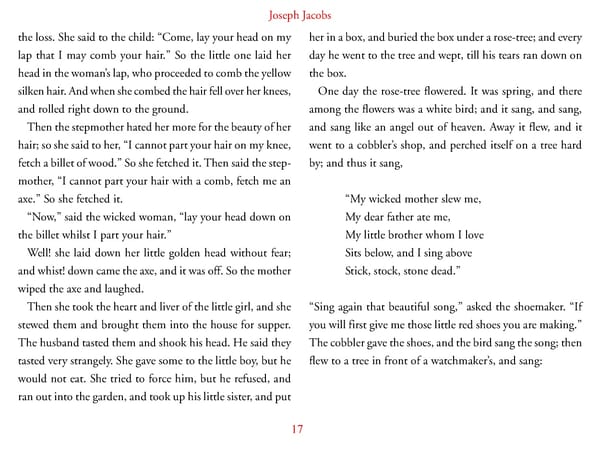17 Joseph Jacobs the loss. She said to the child: “Come, lay your head on my lap that I may comb your hair.” So the little one laid her head in the woman’s lap, who proceeded to comb the yellow silken hair. And when she combed the hair fell over her knees, and rolled right down to the ground. Then the stepmother hated her more for the beauty of her hair; so she said to her, “I cannot part your hair on my knee, fetch a billet of wood.” So she fetched it. Then said the step- mother, “I cannot part your hair with a comb, fetch me an axe.” So she fetched it. “Now,” said the wicked woman, “lay your head down on the billet whilst I part your hair.” Well! she laid down her little golden head without fear; and whist! down came the axe, and it was off. So the mother wiped the axe and laughed. Then she took the heart and liver of the little girl, and she stewed them and brought them into the house for supper. The husband tasted them and shook his head. He said they tasted very strangely. She gave some to the little boy, but he would not eat. She tried to force him, but he refused, and ran out into the garden, and took up his little sister, and put her in a box, and buried the box under a rose-tree; and every day he went to the tree and wept, till his tears ran down on the box. One day the rose-tree flowered. It was spring, and there among the flowers was a white bird; and it sang, and sang, and sang like an angel out of heaven. Away it flew, and it went to a cobbler’s shop, and perched itself on a tree hard by; and thus it sang, “My wicked mother slew me, My dear father ate me, My little brother whom I love Sits below, and I sing above Stick, stock, stone dead.” “Sing again that beautiful song,” asked the shoemaker. “If you will first give me those little red shoes you are making.” The cobbler gave the shoes, and the bird sang the song; then flew to a tree in front of a watchmaker’s, and sang:
 English Fairy Tales Collected by Joseph Page 16 Page 18
English Fairy Tales Collected by Joseph Page 16 Page 18